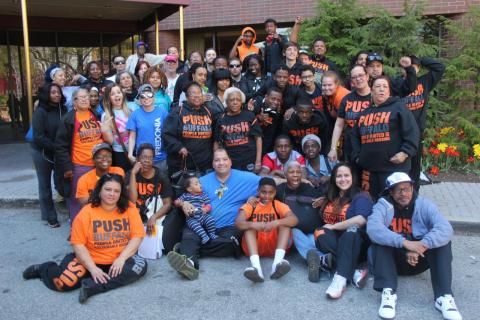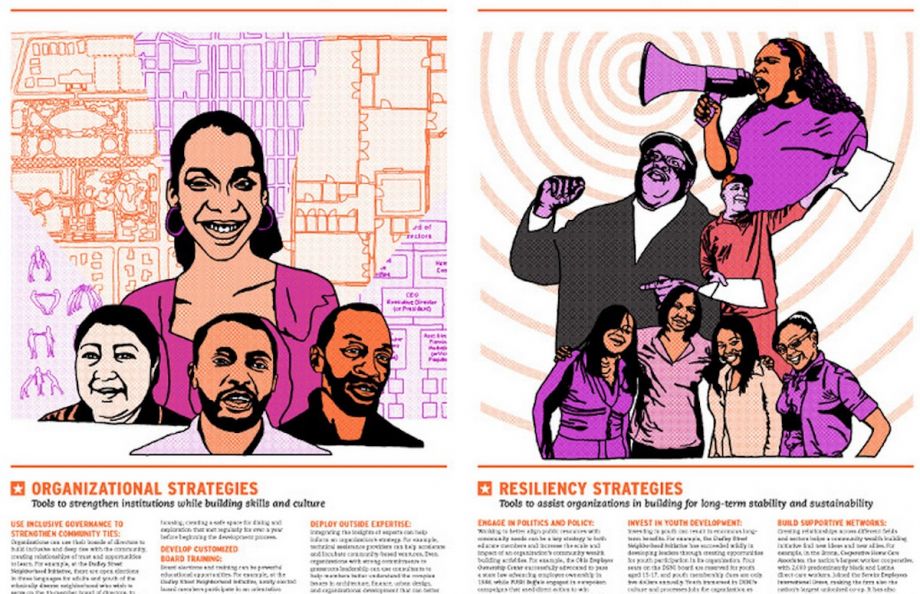Jennifer Meccozi spent two decades chopping onions as a restaurant cook before she became “chief door knocker” in Buffalo, New York, or in other words, director of organizing at People United for Sustainable Housing (PUSH) Buffalo. PUSH is a membership-based community organization dedicated to affordable housing, equitable jobs and ecological sustainability for the West Side of the city.
“People know that there are door-knocking campaigns and community organizers do it all the time, but have they thought of this consciously as a tool for economic development,” explains Keane Bhatt, senior associate for policy and strategy at the Democracy Collaborative, based in Takoma Park, Maryland. Bhatt is co-author of Educate and Empower: Tools for Building Community Wealth, a report released today that features profiles of 11 organizations including PUSH Buffalo.
“What we’ve done is go around to 11 different community-wealth building institutions to try to seek out from a broad diversity of initiatives some kind of underlying themes that are crosscutting in nature,” Bhatt says.
Wealth, given the community economic development focus, is defined here primarily as some form of assets under the community’s control, be it land, a healthcare system, a community bank, or some other economic entity or network of entities.
Community control can mean different things, from worker cooperatives, to community members or workers acting as vocal board directors, to people like Jennifer Meccozi, who started out as a concerned community member and rose up the ranks in PUSH to a leadership position.
The report identifies 21 key crosscutting themes, including tactics like door knocking, participatory learning and inclusive governance, each conveniently summarized in the report’s extended (but not too text heavy) executive summary.
Bhatt says that in some cases, a particular strategy was effective in diverse contexts. Door knocking was one.
Bhatt and co-author Steve Dubb chose the 11 institutions for their diversity. There’s the tiny Wellspring Collaborative, established in 2014 and employing all of six people in inner-city Springfield, Massachusetts. There’s Newark, New Jersey’s massive New Community Corporation, established in 1968, employing 600 local residents, managing 2,000 housing units and owning roughly half a billion dollars’ worth of assets. There’s Market Creek Plaza in San Diego, a $23.5 million, mixed-use, commercial-retail-residential development partly owned by the community.

People United for Sustainable Housing (PUSH Buffalo) is one of 11 organizations covered in Democracy Collaborative’s new report.
And there’s PUSH Buffalo, founded in 2005, which currently owns 92 parcels of land, and among other services and businesses is developing a worker cooperative dedicated to retrofits and weatherization. “PUSH Buffalo shows that when it comes to green energy homes or retrofits and solar, door-knocking campaigns is exactly a tool for economic development,” Bhatt says. “The report tries to take these conventional organizing tools and re-frame them into a community economic development strategy.”
The impetus for the report, according to Bhatt, is that building conventional economic institutions — just a typical small business, for example — is difficult enough, let alone for these 11 alternative economic-driven groups. “How could their rate of survival increase, while retaining and even strengthening their ability to be representative of and accountable to and owned by low-income people,” Bhatt says.
“What we want to share are the ways by which community economic development organizations can build up those kinds of skills and capacities in ways that are respectful of and harness the kind of local knowledge that a lot of these people bring,” Bhatt adds. “How do low-income people become protagonists, the active protagonists in their vision for an equitable and prosperous society, their communities, their family?”
It’s a back-to-basics approach, in some ways. Door-knocking, study circles, participatory learning and other tactics detailed in the report are mostly well-known among community organizer circles, typically used in campaigns to, say, organize to stop a developer from razing homes and displacing residents, or demand something from the city.
In other ways, groups like the New Community Corporation have blazed a trail of using community-organizing tactics as the foundation for large-scale economic development. Yet it’s obvious that most nonprofit professionals, community-minded developers, foundation grant officers or national intermediaries engaged in community-development are, for better or worse, wrapped up in their own worlds to the extent they don’t have time to study such trailblazers in-depth. This report attempts to fill that gap.
The report also dives into the history of community development, starting with the Settlement House Movement at the turn of the 20th century. “Efforts to build institutions to improve poor and working people’s lives are influenced by history, power dynamics, social movements and their relationship to the state,” reads the opening of chapter one. The history lends weight to a time-tested lesson that is worth constant repetition: If you want successful community-driven economic development, you have to start with effective community organization.
“It’s so deceptively simple, right? Just get out there, start knocking on doors and meeting people face to face and that’s the beginning of an economic development strategy,” Bhatt says.
The Equity Factor is made possible with the support of the Surdna Foundation.

Oscar is Next City's senior economic justice correspondent. He previously served as Next City’s editor from 2018-2019, and was a Next City Equitable Cities Fellow from 2015-2016. Since 2011, Oscar has covered community development finance, community banking, impact investing, economic development, housing and more for media outlets such as Shelterforce, B Magazine, Impact Alpha and Fast Company.
Follow Oscar .(JavaScript must be enabled to view this email address)

















